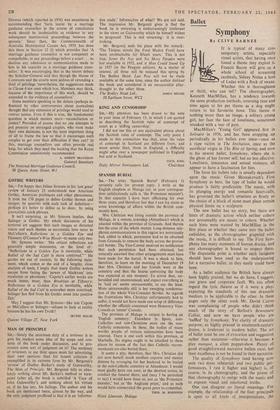SIR,—Surely the minimum duty of a reviewer is to give
his readers some idea of the scope and con- tents of the book under discussion, and to pro- nounce some sort of judgment on it? The tendency of reviewers to use their space more for advertising their own opinions than for honest criticism is exemplified in its extreme form by Mr. Bergonzi's `review' of Dudley Barker's study of Galsworthy, The Man of Principle. Mr. Bergonzi tells us abso- lutely nothing about Mr. Barker's method or view- point (after all, the book is subtitled 'A View of John Galsworthy'), and nothing about his virtues or, if he has any, his failings. The author and his book are mentioned twice, almost by the way, and the only judgment proffered is that it is an Informa- five study.' Informative of what? We are not told. The impression Mr. Bergonzi gives is that the book he is reviewing is embarrassingly irrelevant to the views on Galsworthy which he himself wishes to propound. This is not reviewing: it is over- looking.
Mr. Bergonzi ends his piece with the remark : 'The Tietjens novels [by Ford Madox Ford] have been unobtainable for fifteen years.' This is not true. Some Do Not and No More Parades were last available in 1952, and A Man Could Stand Up in 1957 (in the Penguin edition). As a matter of interest, all three will be reissued this spring by The Bodley Head. Last Past will not be made available at the same time, since the author disliked the book and considered it an unsuccessful after- thought to the other three.
The Bodley Head Ltd., JAMES MICHIE 10 Earlham Street, WC2


































 Previous page
Previous page